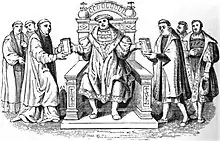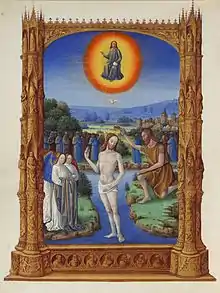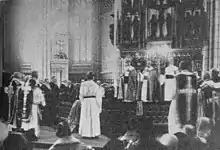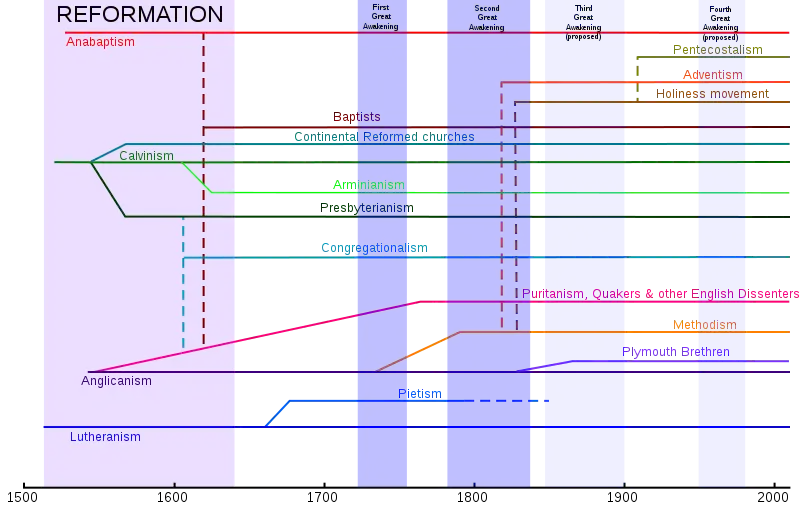Criticism of Protestantism
Criticism of Protestantism covers critiques and questions raised about Protestantism, the Christian tradition which arose out of the Protestant Reformation. While critics praise Protestantism's Christ-centered and Bible-centered faith, Protestantism is faced with criticism mainly from the Catholic Church and some Orthodox Churches, although Protestant denominations have also engaged in self-critique and criticized one another.[2]
| Part of a series on |
| Protestantism |
|---|
 |
|
|
| This article is of a series on |
| Criticism of religion |
|---|

The Catholic biblical critique asserts that the Sola scriptura principle of Lutheran and Reformed Churches[3] is inaccurate according to the Catholic doctrine. While Catholic tradition agrees with Protestantism that faith, not works, is necessary for "initial" justification, some contemporary Protestant Scholars such as N. T. Wright affirm that both faith and works are necessary for justification.[4] Catholic critics also challenge the historicity of the Great Apostasy, a premise of the Protestant Reformation.
Sources of criticism

Historically, certain notable Catholic works were written as a criticism of a Protestant work. For example, when the Lutherans gave the 1530 Augsburg Confession, the Catholics responded with the Confutatio Augustana. Also, Diogo de Payva de Andrada wrote the 1578 Defensio Tridentinæ fidei as a response to the Lutheran Martin Chemnitz, who published the Examination of the Council of Trent from 1565–1573.[5]
While some Catholic leaders have been seeing the positive side of the German Reformer, Martin Luther, calling him "thoroughly Christocentric"[6] and saying that his intention was "to renew the Church and not to divide it",[7] Catholic doctrine views Protestantism as "suffering from defects", not possessing the fullness of truth[8] and lacking "the fullness of the means of salvation".[9]
Protestants also engage in self-criticism, a special target of which is the fragmentation of Protestant denominations.[2] In addition, due to the fact that Protestantism is not a monolithic tradition, some Protestant denominations criticize the beliefs of other Protestants. For example, the Reformed Churches criticize the Methodist Churches for the latter denomination's belief in the doctrine of unlimited atonement,[10] in a long-term debate between Calvinists and Arminians.
Criticism of foundational principles
Sola scriptura

Sola scriptura, one of the Five Principles shared by Lutheran and Reformed Churches, originated during the Protestant Reformation,[3] is a formal principle of many Protestant denominations. Baptist Churches as well share the Sola scriptura principle and state that the Bible alone is the sole source of knowledge,[11][12][13][14] truth and revelation sent directly from God,[11][12][13][14] the only true Word of God,[11][12][13][14] sufficient of itself to be the supreme authority of the Christian faith.[11][12][13][14]
In contrast, the Anglican Communion and the Methodist Church uphold the doctrine of prima scriptura, which holds that Sacred tradition, reason and experience are the sources of Christian doctrine, but are nonetheless subordinate to the authority of the Bible as well.[15][16]
According to Benedict XVI, the Catholic Church holds a very different view on the Bible and does not consider itself to be a "Religion of the book": "while in the [Catholic] Church we greatly venerate the sacred Scriptures, the Christian faith is not a 'religion of the book': Christianity is the 'religion of the Word of God'...together with the Church’s living Tradition, [the Scripture] constitutes the supreme rule of faith."[17]
Sola fide
At "the crux of the disputes" are the doctrine on justification and Sola fide,[18] two of the core principles of Protestantism.
The immediate official Catholic response to the Reformation, the Council of Trent, affirmed in 1547 the foundational importance of faith as part of its doctrinal tradition, "we are therefore considered to be justified by faith, because faith is the beginning of human salvation, the foundation, and the root of all Justification...none of those things which precede justification --whether faith or works-- merit the grace itself of justification."[19]
Many centuries later, in 1999 the Pontifical Council for Promoting Christian Unity and the Lutheran World Federation have found basic doctrinal agreements in the Joint Declaration on the Doctrine of Justification,[18] showing "a common understanding" of the justification:[18] "By grace alone, in faith in Christ's saving work and not because of any merit on our part, we are accepted by God and receive the Holy Spirit, who renews our hearts while equipping and calling us to good works."[18] The document states that the Churches now share "a common understanding of our justification by God's grace through faith in Christ."[18] To the parties involved, this essentially resolves the 500-year-old conflict over the nature of justification which was at the root of the Protestant Reformation. The World Methodist Council formally recognized the Declaration in 2006.[20][21]
Although an important step forward in the Catholic–Lutheran dialogue, the Declaration continues to show the unsurpassable differences of thought that separate the Catholic Church from the Protestant tradition.[18] Lutherans uphold Luther's doctrine that "human beings are incapable of cooperating in their salvation... God justifies sinners in faith alone (sola fide)." According to N. T. Wright, "Paul, in company with mainstream Second Temple Judaism, affirms that God’s final judgment will be in accordance with the entirety of a life led — in accordance, in other words, with works.”[4] Benedict XVI in 2006 declared that "it is to God and his grace alone that we owe what we are as Christians."[22]
Methodist Churches have always emphasized that ordinarily both faith and good works play a role in salvation; in particular, the works of piety and the works of mercy, in Wesleyan-Arminian theology, are "indispensable for our sanctification".[23] Methodist Bishop Scott J. Jones in United Methodist Doctrine says that faith is always necessary to salvation unconditionally.[24] Good works are the exterior result of true faith but are necessary only conditionally, that is, if there is time and opportunity.[24]
Criticism of the Joint Declaration within the Catholic Church
The Vatican's note in response to the Declaration said that the Protestant formula "at the same time righteous and sinner", is not acceptable: "In baptism everything that is really sin is taken away, and so, in those who are born anew there is nothing that is hateful to God. It follows that the concupiscence [disordered desire] that remains in the baptised is not, properly speaking, sin."[25]
Catholic opinion on the Great Apostasy
According to Benedict XVI, the encounter of Christianity with enlightened Greek culture and philosophy is not apostasy into Paganism, but rather a natural development in the history of the early Church;[26] Ratzinger also states that the translation of the Old Testament in Greek and the fact that the New Testament itself was written in Greek are a direct consequence of the biblical revelation's reception by the Hellenistic world.[26]
Apostolic succession

Some Catholic critics state that Protestant acceptance of the Great Apostasy implies their non-acceptance of the apostolic succession in the Catholic Church and Orthodox Churches. At the same time, a number of Protestant Churches, including Lutheran Churches, the Moravian Church, and the Anglican Communion, affirm that they ordain their clergy in line with the apostolic succession;[27] in 1922, the Eastern Orthodox Ecumenical Patriarch of Constantinople recognised Anglican orders as valid.[28][29]
The Catholic Church has rejected the validity of Anglican apostolic succession as well as that of other Protestant Churches,[30] saying in regard to the latter that "the proclamation of Sola scriptura led inevitably to an obscuring of the older idea of the Church and its priesthood. Thus through the centuries, the imposition of hands either by men already ordained or by others was often in practice abandoned. Where it did take place, it did not have the same meaning as in the Church of Tradition."[31]
Criticism of doctrine and practices
Eucharist
Some Catholic critics say that Protestant Churches, including the Anglican, Lutheran, Methodist, and Reformed traditions, each teach a different form of the doctrine of the real presence of Christ in the Eucharist,[32][33][34] with Lutherans affirming Christ's presence as a sacramental union, and Reformed/Presbyterian Christians affirming a pneumatic presence.[34][35] Baptists,[36][37] Anabaptists,[38] the Plymouth Brethren,[38] Jehovah's Witnesses,[39] and other Restorationist Protestant denominations affirm that the Lord's Supper is a memorial of Jesus' death,[38] and consider the belief in the real presence of Christ to be crypto-papist, unbiblical or a misinterpretation of the Scriptures.
Confession and other sacraments
While some Protestants, such as Lutherans, have retained the sacrament of confession,[40][41] most Protestant denominations do not.
Prayers for the dead
The Anglican and Methodist traditions along with Eastern Orthodoxy, affirm the existence of an intermediate state, Hades, and thus pray for the dead,[42][43] as do many Lutheran Churches, such as the Evangelical Lutheran Church in America, which "remembers the faithful departed in the Prayers of the People every Sunday, including those who have recently died and those commemorated on the church calendar of saints".[44]
Historical and ecclesiological critique

Protestant Churches are considered by some Catholic critics as a negative force which "protests" and revolts against the Catholic Church.[45] Catholic theologian Karl Adam wrote: "The sixteenth century revolt from the Church led inevitably to the revolt from Christ of the eighteenth century, and thence to the revolt from God of the nineteenth. And thus the modern spirit has been torn loose from the deepest and strongest supports of its life, from its foundation in the Absolute, in the self-existent Being, in the Value of all values... Instead of the man who is rooted in the Absolute, hidden in God, strong and rich, we have the man who rests upon himself, the autonomous man."[45]
In response to Adam's accusation towards Protestantism, the church historian and Protestant theologian Wilhelm Pauck pointed out that "In summing up [...] the Roman Catholic criticism that the Reformation and Protestantism resulted from a revolt against the Church, we conclude that the Roman Catholic leaders of the sixteenth century are not without responsibility for the break-up of Christian unity",[45] therefore the Schism between Protestants and Catholics was an inevitable consequence of the Protestant Reformation for which both sides have to be considered responsible.[45]
Sexual abuse cases
A report issued by Christian Ministry Resources (CMR) in 2002 stated that contrary to popular opinion, there are more allegations of pedophilia in Protestant congregations than Catholic ones, and that sexual violence is most often committed by volunteers rather than by priests.[46] It also criticized the way the media reported sexual crimes in Australia. The Royal Commission into Institutional Responses to Child Sexual Abuse revealed that between January 1950 and February 2015, 4,445 people alleged incidents of child sexual abuse in 4,765 claims. The media reportedly reported that as many as 7% of priests were accused of being a pedophile, but ignored the same report on the Protestant Churches and Jehovah's Witnesses; Gerard Henderson stated:[47]
That’s 2,504 incidents or allegations in the period between 1977, when the Uniting Church was formed, and 2017. This compares with 4,445 claims with respect to the Catholic Church between 1950 and 2015. And the Catholic Church is five times larger than the Uniting Church. Moreover, the Royal Commission did not include allegations in the period 1950 to 1977 with respect to the Presbyterian, Congregational and Methodist communities which folded into the Uniting Church in 1977. This would take the number of allegations beyond 2,504, especially since it seems that child sexual abuse was at its worst in the 1960s and 1970s. (...) Allegations against the Jehovah Witness religion, on a per capita basis, are dramatically higher than for either the Catholic or the Uniting churches.
— Gerard Henderson
See also
References
- p.280, Thomas More, Richard Marius, 1984, J.M. Dent and Son
- Fred Sanders (21 October 2016). "Does Protestantism Need to Die?". Christianity Today.
- Barber, John (2008). The Road from Eden: Studies in Christianity and Culture. Academica Press. p. 233. ISBN 9781933146348.
The message of the Lutheran and Reformed theologians has been codified into a simple set of five Latin phrases: Sola Scriptura (Scripture alone), Solus Christus (Christ alone), Sola Fide (faith alone), Sola Gratia (by grace alone) and Soli Deo Gloria (glory to God alone).
- Wright, N. T. (August 2003), New Perspectives on Paul, 10th Edinburgh Dogmatics Conference
- Examen, Volumes I-II: Volume I begins on page 46 of the pdf and Volume II begins on page 311. Examen Volumes III-IV: Volume III begins on page 13 of the pdf and Volume IV begins on page 298. All volumes free on Google Books
- Joseph Ratzinger (23 September 2011). "Apostolic Journey to Germany: Meeting with representatives of the German Evangelical Church Council in the Chapter Hall of the Augustinian Convent". Vatican.va.
- "Pope Francis: Martin Luther wanted to 'renew the Church, not divide her'". Catholic Herald. 19 January 2017. Archived from the original on 13 December 2018. Retrieved 13 September 2017.
- "Dominus Iesus". Vatican.va.
- Congregation for the Doctrine of the Faith. "Doctrinal Note on some Aspects of Evangelization". Vatican.va.
- Thorsen, Don (18 February 2015). "Why Wesley, and Not Calvin". Catalyst Resources. Retrieved 20 September 2017.
- "Basic Beliefs: The Scriptures". Southern Baptist Convention. 2018. Retrieved 13 August 2018.
The Holy Bible was written by men divinely inspired and is God's revelation of Himself to man. It is a perfect treasure of divine instruction. It has God for its author, salvation for its end, and truth, without any mixture of error, for its matter. Therefore, all Scripture is totally true and trustworthy. It reveals the principles by which God judges us, and therefore is, and will remain to the end of the world the true center of Christian union, and the supreme standard by which all human conduct, creeds, and religious opinions should be tried. All Scripture is a testimony to Christ, who is Himself the focus of divine revelation.
- "Centennial Statement: Centenary Congress (Birmingham, United Kingdom, July 2005)". Baptist World Alliance. 2018. Retrieved 13 August 2018.
We Declare that the divinely inspired Old and New Testament Scriptures have supreme authority as the written Word of God and are fully trustworthy for faith and conduct; [...] we declare, affirm and covenant to the Lord Jesus Christ and to each other, believing the truth found in Him and revealed in the Scriptures. We [...] boldly declare that we believe the truth is found in Jesus Christ as revealed in the Holy Scriptures. Because we have faith and trust in Him so we resolve to proclaim and demonstrate that faith to all the world.
- "What We Believe: The Scriptures". National Baptist Convention. 2018. Archived from the original on 24 August 2018. Retrieved 26 August 2018.
We believe that the Holy Bible was written by men divinely inspired, and is a perfect treasure of heavenly instruction; that it has God for its author, salvation for its end, and truth without any mixture of error for its matter; that it reveals the principles by which God will judge us, and therefore is, and shall remain to the end of the world, the true center of Christian union, and the supreme standard by which all human conduct, creeds, and opinions shall be tried.
- "Identity Statement: "We Are American Baptists"". American Baptist Churches USA. 1998. Retrieved 8 August 2019.
American Baptists believe that the Bible, composed of the Old and New Testaments, is the divinely inspired Word of God, the final written authority and trustworthy for faith and practice. It is to be interpreted responsibly under the guidance of the Holy Spirit within the community of faith. The primary purpose of the Bible is to point to Jesus Christ, the living Lord of the Church. Although Baptists have produced numerous confessions to express our common understandings of Christian faith, we hold the Scriptures, the Old and New Testaments, as our final authority. We accept no humanly devised confession or creed as binding.
- "Methodist Beliefs: In what ways are Lutherans different from United Methodists?". Wisconsin Evangelical Lutheran Synod. 2014. Retrieved 22 May 2014.
The United Methodists see Scripture as the primary source and criterion for Christian doctrine. They emphasize the importance of tradition, experience, and reason for Christian doctrine. Lutherans teach that the Bible is the sole source for Christian doctrine. The truths of Scripture do not need to be authenticated by tradition, human experience, or reason. Scripture is self authenticating and is true in and of itself.
- Humphrey, Edith M. (15 April 2013). Scripture and Tradition. Baker Books. p. 16. ISBN 9781441240484.
historically Anglicans have adopted what could be called a Prima Scriptura position.
- Joseph Ratzinger (30 September 2010). "Verbum Domini: Post-Synodal Apostolic Exhortation on the Word of God in the Life and Mission of the Church". Vatican.va.
- Lutheran World Federation; Pontifical Council for Promoting Christian Unity. "Joint Declaration on the Doctrine of Justification". Vatican.va. Retrieved 6 August 2018.
- "CT06". History.hanover.edu.
- LaBarr, Joan G. (20 July 2006). "World Methodists approve further ecumenical dialogue". United Methodist Church. Archived from the original on 21 July 2006.
- Wooden, Cindy (24 July 2006). "Methodists adopt Catholic-Lutheran declaration on justification". Catholic News Service. Archived from the original on 25 July 2006. Retrieved 4 July 2017.
- Joseph Ratzinger. "General Audience of 8 November 2006: St Paul's new outlook". Vatican.va.
- Knight III, Henry H. (9 July 2013). "Wesley on Faith and Good Works". Catalyst Resources. Retrieved 16 September 2017.
- Jones, Scott J. (2002). United Methodist Doctrine: The Extreme Center. Nashville, TN: Abingdon Press. pp. 187–191. ISBN 978-0-687-03485-7.
- "Response of the Catholic Church to the Joint Declaration of the Catholic Church and the Lutheran World Federation on the Doctrine of Justification". Vatican.va.
- Joseph Ratzinger (12 September 2006). "Apostolic Journey to München, Altötting and Regensburg: Meeting with the representatives of science in the Aula Magna of the University of Regensburg". Vatican.va.
- Guidry, Christopher R.; Crossing, Peter F. (1 January 2001). World Christian Trends, AD 30-AD 2200: Interpreting the Annual Christian Megacensus. William Carey Library. p. 307. ISBN 9780878086085.
Very many other major episcopal churches, however-Roman Catholic, Orthodox, Old Catholic, Anglican, Scandinavian Lutheran-do make this claim and contend that a bishop cannot have regular or valid orders unless he has been consecrated in this apostolic succession.
- Wright, John Robert; Dutton, Marsha L.; Gray, Patrick Terrell (2006). One Lord, One Faith, One Baptism: Studies in Christian Ecclesiality and Ecumenism. Wm. B. Eerdmans Publishing. p. 273. ISBN 9780802829405.
Constantinople declared, cautiously, in 1922 that Anglican orders "have the same validity as those of the Roman, Old Catholic and Armenian Churches", an opinion echoed by the churches of Jerusalem, Cyprus, Alexandria, and Romania. Heartened, Labeth bishops broadened the dialogue, sponsored the translation of "books and documents setting forth the relative positions" of the two churches, and asked the English church to consult "personally or by correspondence" with the eastern churches "with a view to ... securing a clearer understanding and ... establishing closer relations between the Churches of the East and the Anglican Communion".
- Franklin, R. William (1 June 1996). Anglican Orders: Essays on the Centenary of Apostolicae Curae 1896-1996. Church Publishing, Inc. p. 117. ISBN 9780819224880.
In 1922 the Ecumenical Patriarch and Holy Synod of Constantinople were persuaded to speak of Anglican orders. They did so in Delphic terms by declaring that Anglican orders possessed "the same validity as the Roman, Old Catholic and Armenian Churches possess". Jerusalem and Cyprus followed in 1923 by provisionally acceding that Anglican priests should not be reordained if they became Orthodox. Romania endorsed Anglican orders in 1936. Greece was not so sure, arguing that the whole of Orthodoxy must come to a decision, but it spoke of Anglican orders in the same somewhat detached un-Orthodox language.
- Congregation for the Doctrine of the Faith (10 July 2007). "Responses to some questions regarding certain aspects of the doctrine on the church". Vatican.va.
According to Catholic doctrine, these Communities do not enjoy apostolic succession in the sacrament of Orders, and are, therefore, deprived of a constitutive element of the Church.
- "International Theological Commission: Catholic Teaching on Apostolic Succession". Vatican.va. 1973.
- M'Gavin, William (1833). The Protestant: Essays on the principal points of controversy between the Church of Rome and the Reformed. Hutchison and Dwier. p. 396.
... every Protestant church holds the doctrine of the real presence, while it is expressed in this general form.
- Neal, Gregory S. (19 December 2014). Sacramental Theology and the Christian Life. WestBow Press. p. 111. ISBN 9781490860077.
For Anglicans and Methodists the reality of the presence of Jesus as received through the sacramental elements is not in question. Real presence is simply accepted as being true, its mysterious nature being affirmed and even lauded in official statements like This Holy Mystery: A United Methodist Understanding of Holy Communion.
- Mattox, Mickey L.; Roeber, A. G. (27 February 2012). Changing Churches: An Orthodox, Catholic, and Lutheran Theological Conversation. Wm. B. Eerdmans Publishing. p. 54. ISBN 9780802866943.
In this "sacramental union", Lutherans taught, the body and blood of Christ are so truly united to the bread and wine of the Holy Communion that the two may be identified. They are at the same time body and blood, bread and wine. This divine food is given, more-over, not just for the strengthening of faith, nor only as a sign of our unity in faith, nor merely as an assurance of the forgiveness of sin. Even more, in this sacrament the Lutheran Christian receives the very body and blood of Christ precisely for the strengthening of the union of faith. The "real presence" of Christ in the Holy Sacrament is the means by which the union of faith, effected by God's Word and the sacrament of baptism, is strengthened and maintained. Intimate union with Christ, in other words, leads directly to the most intimate communion in his holy body and blood.
- Brogaard, Betty (2010). The Homemade Atheist: A Former Evangelical Woman's Freethought Journey to Happiness. Ulysses Press. p. 104. ISBN 9781569757840.
The objective reality, pious silence, pneumatic presence, and receptionism views of Holy Communion ... are held by churches of the East--the Eastern Orthodox Church; Reformed Christians like Presbyterians ... they reject that communion is merely or strictly symbolic and accept the real "spiritual" presence in the elements.
- "Basic Beliefs: Baptism & the Lord's Supper". Southern Baptist Convention. 2018. Retrieved 26 August 2018.
The Lord's Supper is a symbolic act of obedience whereby members [...] memorialize the death of the Redeemer and anticipate His Second Coming.
- "What We Believe: Baptism & the Lord's Supper". National Baptist Convention. 2018. Archived from the original on 24 August 2018. Retrieved 26 August 2018.
We believe the Scriptures teach that Christian baptism is the immersion in water of a believer, into the name of the Father, and Son, and Holy Ghost; to show forth in a solemn and beautiful emblem, our faith in the crucified, buried, and risen Savior, with its effect, in our death to sin and resurrection to a new life; that it is prerequisite [...] to the Lord's Supper, in which the members of the church, by the sacred use of bread and wine, are to commemorate together the dying love of Christ; preceded always by solemn self-examination.
- Balmer, Randall Herbert; Winner, Lauren F. (2002). Protestantism in America. Columbia University Press. p. 26. ISBN 9780231111300.
- "The Lord's Evening Meal: An Observance That Honors God". What Does The Bible Really Teach?. Watch Tower Bible and Tract Society of Pennsylvania. 2014 [2005]. pp. 206–208. Retrieved 18 July 2020.
- Haffner, Paul (1999). The Sacramental Mystery. Gracewing Publishing. p. 11. ISBN 9780852444764.
The Augsburg Confession drawn up by Melanchton, one of Luther's disciples admitted only three sacraments, Baptist, the Lord's Supper and Penance. Melanchton left the way open for the other five sacred signs to be considered as "secondary sacraments". However, Zwingli, Calvin and most of the later Reformed tradition accepted only Baptism and the Lord's Supper as sacraments, but in a highly symbolic sense.
- Smith, Preserved (1911). The Life and Letters of Martin Luther. Houghton Mifflin. p. 89.
In the first place I deny that the sacraments are seven in number, and assert that there are only three, baptism, penance, and the Lord's Supper, and that all these three have been bound by the Roman Curia in a miserable captivity and that the Church has been deprived of all her freedom.
- Cook, Joseph (1883). Advanced thought in Europe, Asia, Australia, &c. London: Richard D. Dickinson. p. 41.
Anglican orthodoxy, without protest, has allowed high authorities to teach that there is an intermediate state, Hades, including both Gehenna and Paradise, but with an impassable gulf between the two.
- Gould, James B. (4 August 2016). Understanding Prayer for the Dead: Its Foundation in History and Logic. Wipf and Stock Publishers. pp. 57–58. ISBN 9781620329887.
The Roman Catholic and English Methodist churches both pray for the dead. Their consensus statement confirms that "over the centuries in the Catholic tradition praying for the dead has developed into a variety of practices, especially through the Mass.... The Methodist church ... has prayers for the dead ... Methodists who pray for the dead thereby commend them to the continuing mercy of God."
- Gould, James B. (4 August 2016). Understanding Prayer for the Dead: Its Foundation in History and Logic. Wipf and Stock Publishers. p. 50. ISBN 9781532606014.
- Pauck, Wilhelm (1 April 1948). "The Roman Catholic Critique of Protestantism". Theology Today. Princeton Theological Seminary. 5 (1): 34–48. doi:10.1177/004057364800500106 – via SAGE Journals.
- Clayton, Mark (2002). "Sex abuse spans spectrum of churches". The Christian Science Monitor.
- Henderson, Gerard (2017). "Gerard Henderson: The media, the Commission and the Church". Catholic Weekly.